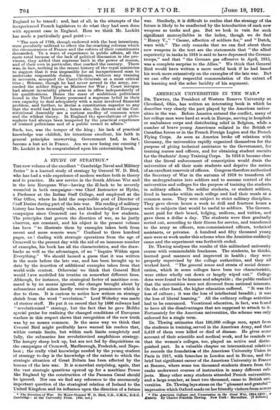AMERICAN UNIVERSITIES IN THE WAR.*
Da. TRWING, the President of Western Reserve University at Cleveland, Ohio, has written an interesting book in which he describes very clearly the part played by the American univer- sities in the war. Before America entered the conflict, many of her college men were hard at work in Europe, serving in hospitals or ambulance corps and distributing relief in Belgium, while a number of brave young Americans enlisted in the British or Canadian forces or in the French Foreign Legion and the French Flying Corps. As soon as America broke off relations with Germany, the universities rapidly organized themselves for the purpose of giving technical assistance to the Government, for training nurses and officers, and for obtaining student recruits for the Students' Army Training Corps. In 1918 it became clear that the literal enforcement of conscription would drain the universities of all their male students and deprive the nation of an excellent reservoir of officers. Congress therefore authorized the Secretary of War in the autumn of 1918 to transform all the undergraduates into soldiers and to assume control of the universities and colleges for the purpose of training the students in military affairs. The soldier students, or student soldiers, lived in barracks within each college and had their meals at a common mess. They were subject to strict military discipline. They gave eleven hours a week to drill and fourteen hours a week to subjects that would be useful to soldiers. The Govern- ment paid for their beard, lodging, uniform, and tuition, and gave them a dollar a day. The students were then gradually sorted out, according to their fitness for service, and transferred to the army as officers, non-commissioned officers, technical assistants, or privates. A hundred and fifty thousand young men were at work under this scheme when the Armistice suddenly came and the experiment was forthwith ended.
Dr. Thwing analyses the results of this militarized university course with commendable frankness. The students, he thinks, learned good manners and improved in health ; they were properly supervised by the college authorities, and they all worked hard. " The general zones and strata of social demar- cation, which in some colleges have been too characteristic, were either wholly cut down or largely wiped out." College dons were found to be human and adaptable ; the public realized that the universities were not divorced from national interests. On the other hand, the higher education suffered. " It was the loss of culture ; it was the loss of intellectual breadth ; it was the loss of liberal learning." All the ordinary college activities had to be renounced. Vocational education, in fact, was found to have all the disadvantages that are supposed to attach to it. Fortunately for the American universities, the scheme was only enforced for a single term.
Dr. Thwing estimates that 180,000 college men, apart from the students in training, served in the American Army, and that 5,419 of them were killed or died of disease. He gives some account of their scientific and medical work, and he reminds us that the women's colleges, too, played an active and distin- guished part. In a valuable chapter on international relations he records the foundation of the American University Union in Paris in 1917, with branches in London and in Rome, and the brief but significant career of the American University in France at Beaune, where some ten thousand students drawn from the ranks underwent courses, of instruction in many different sub- jects. Many other army students attended French universities, and a large number, at least two thousand, came to British uni- versities. Dr. Thwing lays stress on the " pleasant and grateful " impression which Oxford made on her friendly visitors from across • The American Colleges and Universities in the Oreat War,. 1914-1919: a Eiger,. BY Charles Franklin Thwing. New York : Macmillan. [3 dollars.] the Atlantic ; Oxford, we are sure, will never forget them. Dr. Thwing, in estimating the enduring effects of the war on American universities; says that the students have become more serious, and that they feel a deeper responsibility for the community and show a keener appreciation of international problems. " The studies called social, dealing with men in relation to each other—history, economics, government, political science, socio- logy—have been lifted to places higher and broader in the academic order." It is perhaps too soon to say whether these effects are more than transient, but for the time being the educated youth of America is conscious of America's importance to a troubled world.



































 Previous page
Previous page